King Digital, publisher of the popular mobile game Candy Crush Saga, began trading as a public company today on the NYSE not with a pop but with a drop. The stock, trading as KING, commenced trading at only $20.50, down nearly 9% on the $22.50 per share it announced on Tuesday.
By the close of trading, King.com’s stock was at $19 per share, down 15.56%. After hours, King.com’s share price continued to fall.
It’s a sign that after healthy debuts for the likes of Twitter and a number of other tech companies in the last 12 months after Facebook’s stumble, it’s clear that investors are not taking all tech IPOs with open arms.
The $22.50 was at the mid end of the $21-24 range it initially set when it filed on March 12 for the IPO. At $22.50 the company raised $326 million at a $7 billion valuation.
In this first opening hour of trading, King.com’s stock has been in a volatile state, dropping as low as $19.08 a share before climbing back up and then down again.

The $22.50 price yesterday valued the company at around $7 billion. At a $20.50 price that valuation goes down to $6.5 billion.
The King.com IPO is something of a bellwether for a couple of reasons.
First, it’s the first big public listing for the gaming industry since Zynga in 2011. After a flurry of activity and a small pop on opening day, Zynga’s shares declined 75% in the year after it listed. Popping at $11 per share on its debut day in 2011, Zynga’s shares are currently bobbing along at just under $5.
That’s had a cooling effect on other companies in the space who might have otherwise entertained similar routes. Supercell, one of the standouts in mobile gaming in the last year, notably took a very large investment from Softbank last year, 51% at a $1.53 billion price, as an alternative way of raising capital and giving its shareholders and employees liquidity.
Second, it’s a measure of how well a mobile-first and free-to-play casual gaming company can are on the markets today. Initially, analysts pointed to Zynga’s lack of a strong mobile gaming portfolio — and too strong a reliance on the Facebook platform — as two reasons for why its stock and business have not fared so well. In that regard, King.com’s formula of taking popular casual games and retooling them specifically for mobile should have been an antidote to these problems.
However, as Alex has described, there has been another challenge facing King.com: it’s effectively only proven to be a one-hit wonder.
King.com made the majority (78%) of its $1.88 billion in revenue in 2013 from Candy Crush Saga, which currently clocks up 97 million daily active users and over 1 billion daily game plays. But with no other games in its current pipeline that are nearly as strong as this, it’s a sign from the market that it is skeptical of whether King.com will manage to move beyond that.
Third, there is the question of what this might mean for European startups looking to list in the U.S. King.com was founded in the UK started out with operations in the UK, Denmark and Sweden before expanding elsewhere on the continent. Even today it’s incorporated in Ireland. Although the U.S. is a major focus for its business, it’s not a U.S. company first and foremost. Is that issue more a problem for King.com specifically, or potentially for other tech companies looking to make that leap?
Image: @eringriffith
